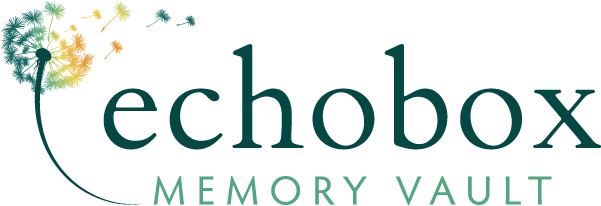About Us
Echobox Memory Vault was inspired by the BBC News story of Stan Beaton, a widower and old age pensioner living in Yorkshire, England. His late wife Ruby’s voice still remained on their answering machine and he treasured the sound of every word. The heartbreaking loss of this precious recording followed by its safe return was overwhelming for Stan, and it was incredibly touching to watch.
(Here is the YouTube video about Mr Beaton that started it all for us: https://www.youtube.com/watch?v=HY7gSAYAf8s).
We knew there must be a better way for us to capture the memories, sentiments and life stories of our elder loved ones. It was shocking to discover that despite incredible advancements in technology, these astounding opportunities for healing, understanding and connection were being missed, greatly undervalued or completely ignored altogether. It seemed absolutely disgraceful to us. We felt strongly we had discovered a long-untended gap that was in sore need of filling. So, without any clue about what we were getting ourselves into we took a deep breath, set up camp and got down to work.
***********************************************
Echobox began as a sketch and a set of notes on our kitchen table. We had little knowledge about running a small business (let alone forwarding an innovation), had no particular interest in apps or technology and neither of us had any experience in caregiving whatsoever – but you have to start somewhere, right!? Our pilot model finally launched and was soon showcased on local, National (CTV) and International (BBC) News! Somehow, we were quickly beginning to attract the attention of healthcare specialists from all around the world! It was marvellously baffling but it soon started to make more sense. In the feedback we were receiving there was an encouraging and reoccurring theme: Echobox had a much bigger role to play.
We met with hundreds of caregivers, listened to them closely and learned a lot about various daily challenges. We earned a huge appreciation for the difficult work they do for those in their care. Their advice and contributions went directly into the makings of our new design. Meanwhile, Echobox Memory Vault was awarded $100,000 in grant funding by Alberta Innovates to help us with the new iteration’s development costs! It was full steam ahead!
We finished the new build in early 2024 and for the next few years we’ll be promoting this revolutionary tool Internationally at several conferences and conventions as a person-centered senior healthcare solution. Echobox continues to drive us forward. It gives us an incredible sense of purpose and is quite literally a dream coming true. We hope that our passion for this project and our devotion to helping seniors and their caregivers will steward this technology to its rightful place in healthcare. Together, we can do this everyone! Big bear hugs to everyone who has helped us out!

Stan Beaton

Timothy and Tannis Roberts
Timothy and Tannis Roberts live in Calgary, Canada where they raise their two daughters and manage Echobox. Music, travel and food are often priorities in their lives as they always enjoy meeting new people and exploring new places. Their scruffy dog Higgins and two cats Frobisher and Wembley keep them busy at home. Tim is an artist who enjoys playing guitar and watching his favorite hockey team struggle, while Tannis (a book-lover through and through) is often hunting down the next mouthwatering recipe to bubble up! Both feel incredibly fortunate to be running Echobox and greatly appreciate this opportunity to do their part for people everywhere.
Acceptable Use Policy | Cookie Policy | Master Terms of Service | Master Terms of Use | Privacy Policy
Copyright Echobox Memory Vault 2024
